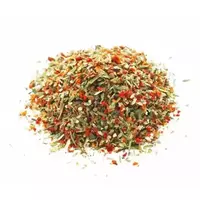Vegetable seasoning

Compared to other types of flavoring additives, vegetable seasoning practically does not contain table salt, and the spices included in its composition are perfectly combined with a huge set of plants. By the way, plants in vegetable seasoning are selected in such a way that they harmoniously combine to taste with many dishes - vegetable, meat, fish, based on poultry, mushrooms, as well as those that include a variety of side dishes.
The spices used in the vegetable seasoning are represented by dried, ground or non-ground different parts of plants, each of which has a specific stable aroma and a different degree of burning. The latter, by the way, is due to the content of essential oils, alkaloids and glycosides. By improving the taste characteristics of food, spices can also enhance the effect of food on the digestive tract, contributing to its better absorption.
In addition, many spices in the composition of the vegetable seasoning differ in antioxidant and bactericidal properties, which determines their preservative effect if added to food products. Consumed in small doses, vegetable seasoning is able to transfer these properties to the finished dish and increase the safety of food products, as well as change the taste of the meal in the direction desired for us.
Traditionally, vegetable seasoning includes edible salt (iodized), dried vegetables (carrots, parsnip root, onions and green, dill, celery and its root, parsley, garlic, basil). In addition, sugar, corn starch, palm oil-based vegetable fat, ground vermicelli crumb, turmeric, paprika, sweet and red ground pepper, cumin, tomato powder and bay leaf are often added.
Each of these natural components carries a share of beneficial qualities. For example, the main function of iodized table salt is to normalize metabolism and thyroid activity.
Dry vegetables in the composition of vegetable seasoning contain fiber, which improves the motility of the gastrointestinal tract, and supply the body with trace elements necessary for normal life (copper, zinc, manganese and iron).
Garlic and onion powder gives the vegetable seasoning not only a pleasant and slightly savoury aroma, but also removes cholesterol, stimulates the separation of bile and digestive enzymes, intestinal peristalsis. In addition, special substances in the composition of these components prevent the development of putrefactive flora in the colon.
Even vegetable fat contributes - it has a beneficial effect on lipid metabolism. And the spices in the composition of the vegetable seasoning stimulate the secretion of gastric juice, thereby helping to improve the process of digestion and absorption of fats, carbohydrates and proteins.
vegetable seasoning 173 kCal
Energy value of vegetable seasoning (Ratio of proteins, fats, carbohydrates - ju):
Proteins: 10.3 g (~ 41 kCal)
Fats: 1.5 g (~ 14 kCal)
Carbohydrates: 29.5 g (~ 118 kCal)
Energy ratio (bj | y): 24% | 8% | 68%
 Español
Español Français
Français Português
Português Русский
Русский 简体中文
简体中文 繁體中文
繁體中文 日本語
日本語 한국어
한국어 العربية
العربية Türkçe
Türkçe Қазақ
Қазақ Deutsch
Deutsch Italiano
Italiano Українська
Українська
